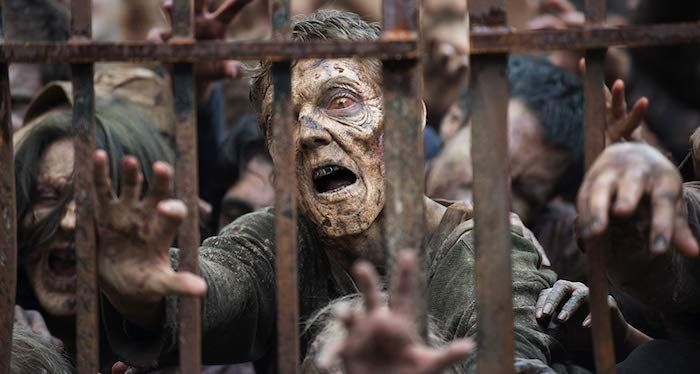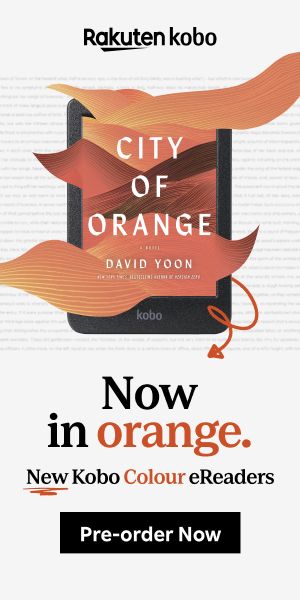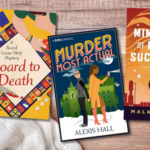
From Braaaiiiins to Hordes: What Are Zombies a Metaphor For?
Decades ago, zombies were slow-moving corpses. They lurched along, arms outstretched, hungry for brains. Then something strange happened: they got fast. Really fast. (12 seconds fast, if you’ve seen the film adaptation of Max Brook’s World War Z.) And they weren’t so hungry for brains anymore. Instead, they just wanted to infect us all.
I’m aware that I’m talking about movies. Don’t worry, I’ve got plenty to say about zombies in literature, too. It’s just that zombies have an unsettling habit of clawing their way out of the page and onto the screen. It’s not a coincidence, either. After all, zombies are one of those monsters that have a lot to tell us about ourselves.
Additionally, it’s clear that they’ve experienced a resurgence in the 21st century and that many critics point to 9/11 and its aftermath as playing a crucial role in this renewed popularity. Some scholars have posited that zombies in the post-9/11 era are allegories for terrorism, while others have theorized them in terms of the posthuman (in brief, the idea of zombies as having moved beyond the commonly accepted parameters of what we consider human, whether because of science, technology, or evolution in the future).
I think these readings are definitely valid, even as I think that some zombie stories open the door for a broader reading. Perhaps it’s not terrorism, specifically, but terror itself (which, after all, was often about terrorism in the post-9/11 era). And if zombies are innately tied to fear, then the question becomes: Fear of what?
In Jeffrey Jerome Cohen’s essay in the collection Monster Theory: Reading Culture, he advances the argument that monsters (such as zombies) are reflective of the pervasive cultural anxieties of their times. More succinctly, Cohen writes that the monster’s body is pure culture — it represents the feared Other, the taboo, the secretly desired. It is, in other words, a vehicle for exploring a society’s anxieties.
So what exactly are we, as a society, exploring through zombies in this moment? What fears lie at the heart of these masticating masses? What are zombies a metaphor for?
Theory 1: The Implosion of Humanity
Max Brooks’s hugely popular novel World War Z: An Oral History of the Zombie War is told in the style of an oral history project. (Think Studs Terkel’s work on the Great Depression, WWII, and more.) It’s interesting that Brooks’s 2006 novel takes this specific form — one often associated with world-changing events — and comes out in the fairly immediate aftermath of 9/11. But while 9/11 is there in the background in certain ways, the novel isn’t so much about terrorism as it is about humanity turning on itself.
One of the things that emerges in Brooks’s novel (and others that portray the zombie apocalypse in similar ways) is the portrayal of zombies as tied to an uncontainable contagion. It’s about the unnamed masses, literal rivers of people-turned-zombie spreading a deadly contagion across the globe. Is it significant that Brooks’s Patient Zero was a 12-year-old boy in a remote village in what we’d call China? Is it significant that the virus spreads from the developing to the developed world? Is it significant that the World Health Organization is ultimately the group to find the cure for zombieism?
The anxieties that circulate at the heart of World War Z are so much about humanity turning on itself, about an uncontainable tide of humanity surging from third world to first, infecting the current world order (and wealth and power structures) with its irrepressible posthuman demands. You can ignore Patient Zero, but all that will get you is a faster spread.
In Brooks’s novel, then, zombies are ignored at the peril of the so-called developed world. They are out there, and they are coming for all of humanity. And who are they? The humans who have been subjected to the most systemic and orderly processes of disenfranchisement, poverty, and oppression at the hands of their first-world counterparts.
Theory 2: The Evil Within Us All
Of course, not all zombie narratives are as optimistic as World War Z. After all, someone is recording that oral history in Brooks’s novel, and a cure has been discovered, which means that humans survived after all. But none of this is a given in Robert Kirkman’s landmark comic series The Walking Dead. The world Kirkman creates is, in a word, bleak. In some more words: brutal, devastating, and terrifying.
In the introduction to the very first volume of The Walking Dead, Kirkman writes, “Good zombie movies show us how messed up we are, they make us question our station in society…and our society’s station in the world.” He goes on to say, “With The Walking Dead, I want to explore how people deal with extreme situations and how these events CHANGE them.” Once you start reading, you get exactly what he’s talking about.
See, in The Walking Dead, as in other zombie narratives that share its interest in social commentary and thinking through how humans might react in a real zombie apocalypse, zombies are all about the monstrosity that lies beneath the surface of civility for humans. They’re highly dangerous, of course…but they’re also us. As in, they started out human and then turned into these deadly, mindless, relentless monsters.
Oh, and of course the thing about Kirkman’s comic series is that it’s not just about zombies; it’s also deeply and terrifyingly about the humans who manage not to turn into zombies. When the zombie apocalypse has happened and human societies around the world have collapsed, the remaining humans of this universe are forced to band together with other survivors…and not all survivors are good.
Kirkman delivers a character named The Governor who is the manifestation of all the evil and cruelty humans are capable of. Through this character (and others like him), zombie narratives raise questions of what human beings are capable of. They ask readers to consider who is truly monstrous: the literal monsters, or humans?
Theory 3: Ourselves…Our Greedy, Greedy Selves
In an almost total about-face from Kirkman’s zombified universe is Ling Ma’s rather literary zombie novel Severance. In this zombie narrative, the infamous bite isn’t really a thing. Instead, what we’d call “zombies” are called the “fevered” and are sometimes indistinguishable from living humans.
You might be thinking, biteless zombies?? What’s so scary about that? And what do they show us about ourselves that we’re so scared of? Well, interestingly, Ma’s novel is really all about memory, nostalgia, and being caught up in a neverending cycle of sentimental stagnation.
The fevered repeat our most mundane moments: setting the table, watching TV, working our jobs…the list goes on. And they do these things ad nauseum, literally disintegrating (in one case, one of the fevered is seen folding clothes in an abandoned storefront with their entire jaw and half their face missing) as they play out their daily routines literally forever.
In other words, Ma’s zombies represent one of our truly greatest fears: that the lives we’re living don’t matter. That a mindless zombie could perform our work duties and go though the motions of family dinners and nobody would ever notice. What’s so clever about Ma’s zombies is that they reflect us back at ourselves in order to ask us what exactly we’re doing with our lives.
And then there’s the issue of consumerism. Ma’s narrator works for a global corporation that’s all about producing Bibles for every audience for the least amount of money possible. There are scenes of capitalism gone awry sprinkled throughout the narratives like maggots in a corpse, thus reinforcing the ways global capitalism is turning humans into corporate drones — a role the narrator continues to perform well into the zombie apocalypse in order to secure a major bonus for continuing to go into the office despite the collapse of humanity.
Oh…and did I mention the mall? (I’m about to massively plot spoil, so skip to the next section if you don’t want that!) Yup, you read that right: just like the human survivors in George Romero’s film Dawn of the Dead, Ma’s human survivors are literally on an odyssey to (you guessed it) a mall. In the Midwest — the U.S.’s so-called “heartland.” And the guy leading them on this journey? Turns out he’s a part-owner of said mall. And our narrator gets imprisoned in a cell there. And she’s pregnant. Soooooo much symbolism there — unborn future generations are already being trapped by capitalist greed so that they can be raised in the nostalgic wastelands of U.S. American consumerism.
What’s Next?
The uncanny parallels between Severance and the early days of the COVID-19 pandemic have been well explored. Similarly, Max Brooks has given many interviews and made many public statements about the connections people saw between World War Z and the pandemic. The connections are significant enough that I wonder if we might expect to see a reanimation of the zombie in pop culture. But what might a post-‘rona zombie reflect back at us?
Since so many zombie narratives imagine the consequences of a global (zombie) pandemic, with its attendant questions about Patient Zero, how might zombies change now that the world is living with the ongoing reality of a global pandemic? After all, we’ve been living through the COVID-19 pandemic for the past two years. Has experiencing it, turning fear into reality, rid the zombie of what it had to offer us as a metaphor? We’ll just have to wait and see.
Grr, Argh: More Zombie Reads
You can never have too many zombie reads, so if this essay leaves your brains craving moooorrrreeee then have no fear! You can always take a gander at this list of awesome zombie books for adults, or (for the faint of heart) this list of zombie books for scaredy cats. And you simply can’t go wrong with the thorough list of the best zombie books this side of the grave. Got some little ones who want in on the zombie fun? We’ve got a robust list of zombie books for kids.










